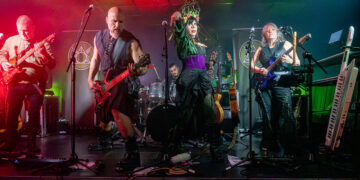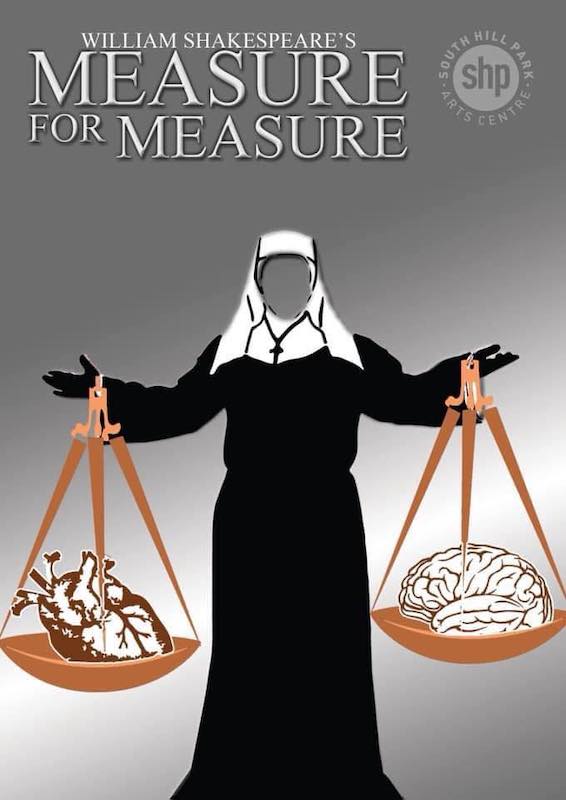- Stars (out of 3) = 2
- One-sentence review = this is how Shakespeare would’ve done it if they had Father Ted + Queen in the 1600s (plus: Brexit).
- Good for people who = like explosively loud shirts & creative reinterpretations of classic plays.
- Not good for people who = think Queen-meets-Shakespeare would make Lawrence Olivier turn in his grave.
- Would Alan Bennet like it = he’d pretend not to, but deep down inside he probably would.
Theatre goers – and the world at large – can be divided into two groups of people: those for whom the words “Like doth quit like” engender interest, and those like myself who find themselves lost, bored and in need of a fizzy drink amidst a sea of “th”’s.
Seriously, I have never been to a Shakespeare play that made any degree of sense until at least 20 minutes (or a hasty bathroom break to read Wikipedia’s plot summary) had passed. And if done badly, they become interminable endurance tests in which you try in vain to convince yourself that a woefully poor disguise that wouldn’t fool anyone can, in fact, make Duke Orsinio believe that Viola is actually a man. On one particularly painful and desperate occasion, I spent the whole of an outdoor production’s second half gazing, enraptured, at a passing squirrel.
Thank Falstaff then that the Studio Theatre Company’s version of “Measure For Measure” presented enough energetic whimsy, gutsy soundtrack choices and politically-savvy commentary to keep even this most easily-distracted of Shakespeare doubters engaged for its duration.
The plot in brief: Vincentio (Alex Hobbs), Duke of Vienna, decides for reasons that I entirely failed to grasp that it makes sense to temporarily hand over control of his city to Angelo, a law-loving and generally fun-killing judge (Hayley Richardson, in a role written originally for men). Her decision to close the city’s brothels and mete out severe punishments to any man who has gotten a woman with child pre-marriage (while liberally bending the rules herself) goes down rather badly, resulting in a death sentence for Claudio (Matt Thompson), lamentations and fumbling chat-up lines for his virginal sister Isabella (Sophie Earle) and humorous commentary by flamboyant soldier Lucio (Alex Daykin)…while the Duke himself dons a habit and, following what must be the easiest holy initiation ceremony in history, gains access and bears witness to everything as it goes down. While, naturally, conversing with everyone he knew as his alter-ego the Duke and yet remaining unrecognised by them all.
The fact that this frankly ridiculous premise works is due entirely to Alex Hobbs’s thoroughly entertaining faux-Irish accent, adopted for his moments as the monk and brilliantly redolent of Ardal O’Hanlon’s Father Dougal in the seminal Channel 4 series “Father Ted”. You almost expect him to appear on stage clutching a He-Man bedspread or driving a milk float. He is no less engaging as the Duke when shorn of his disguise and adopted brogue, his tentative delivery suggesting a ruler who knows roughly what he wants to say and do, but has no idea how to actually say or do it. There is something of the politician perpetually caught on the hoof about him, and you can begin to understand why taking a reprieve from power and handing the lot over to someone patently unqualified to do the job might’ve seemed like a capital idea at the time.
Meanwhile, the decision to recast the Isabella-besotted Judge Angelo as a woman proves successful, as Richardson’s take on the role is powerful and engaging – it’s actors like this who turn dry Shakespearian text into words we can all understand, into poetry. Her performance makes up for the fact that the gender-switch doesn’t entirely work at all times – the character is still referred to as “Lord” here and there, and it seems unbelievable in light of history’s harsh lessons that a society which accepts the sexual repression of brothels and enforces the sanctity of marriage would at the same time be unblinkingly permissive about homosexuality. Likewise some may raise eyebrows at the decision to apply a homosexual reading to the play’s villain, rather than to one of its more positive characters, decrying the continuation of decades’ worth of similar practice that inadvertently helped to entrench negative portrayals of homosexuality in the media.
Others may not care though, and said eyebrows would nevertheless settle upon the arrival of Alex Daykin’s utterly enrapturing portrayal of Lucio. Bedecked in an eye-popping combination of Rupert Bear’s yellow trousers, snakeskin shoes, psychedelic silk shirts slashed down to the navel and a cavalcade of multi-hued waistcoats, he struts, lounges, leans and preens his way across the stage, delivering his bawdy lines with acid-drenched style and panache. It’s as if an exuberant Bertie Wooster has gained a coke habit and spent several months hanging out with Russell Brand, and Daykin once again wins my “performance of the year” award.
The trappings of the production present a modernist take on how it would probably have been staged back in the 1600s – a huge cross adorns one side of the stage, and a wooden bench becomes an adaptable prop, but that’s it apart from the actors. In place of baroque instrumentation, we have a soundtrack heavy on Queen and random audio samples from the House of Commons – the strains of “Fat Bottomed Girls” give way to a random yells of “Mr Speaker” and “Brexit”. Clothes veer from the medieval to jeans and waistcoats. Is this set in days modern or olden? It’s as much of a chaotic mélange as Lucio’s explosive wardrobe, but t’is as equally entertaining for it.
A perusal of the programme upon my return home informs me that the production is intended to be set in the near future, Austria and Hungary on the verge of war in a post-Brexit world as Austria strives to assert independence through the setting of its own sexual laws. I have to say I would’ve missed this entirely were it not for the programme, but if you’re more attentive than I and read it before the play begins (free tip: it’ll save you a Wikipedia-themed bathroom break), it definitely lends additional relevance to the play’s depiction of corrupt and incompetent power structures.
The rest of the cast and crew do an admirable job of making a 400-year old play feel fresh and entertaining, and the mixture of familiar and new faces attests to director Luke Burton’s continued skill at welcoming and showcasing acting talent from the local community.
When Shakespeare is presented with this much verve and enthusiasm, it’s definitely worth watching. You can book tickets (£12-£14) at https://www.southhillpark.org.uk/events/measure-for-measure-2/var/ri-1.l-L1/, with the show running from the 17th– 20th July.
















































